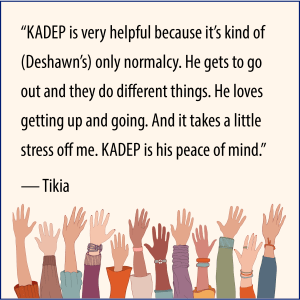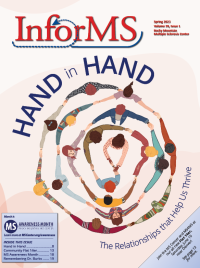Tikia is 37 years old, the mother of two teenage daughters, and the primary caregiver to her older brother Deshawn.
“When Deshawn first got MS, I was 19 and I had my first child,” says Tikia. “My Mom was taking care of him, and he lived in a nursing home for a little bit. Then my Mom got him out of there and began to take care of him herself. She asked me to help and it was kind of difficult for me because I was young and I didn’t know that much about it. I was thinking, ‘What the heck is MS?’”
Deshawn was an outgoing and ambitious college student at the time of his diagnosis. “He came back home to Colorado for a holiday break,” said Tikia. “He was playing basketball and he just collapsed. I didn’t know much about it or understand it. I was young and started helping because it was such a struggle for my mom, but as a young new mother it was kind of hard taking that on.”
“You’re dealing with your own emotions,” she said, “and you don’t want to make them feel bad about something they can’t control.”
Tikia recalls that she wanted to do whatever she could to help Deshawn. She was the “baby sister,” after all — and Deshawn had always looked out for her.
Now nearly 20 years later, their lives have drastically changed again.
“We lost our mother to COVID in 2021,” says Tikia. While Tikia has been an ever-present figure in Deshawn’s life, until recently their mother had been Deshawn’s primary caregiver at home.
Together, they’re finding a new balance, new routines, and adjusting to a new reality without their mother. “It’s been a struggle — Deshawn is battling his own depression.”
 Tikia’s routine concerns aren’t uncommon among families living with MS. ”It’s a challenge getting Deshawn around. He’ll usually use his manual wheelchair, because we don’t have a vehicle to accommodate his power chair. That means he also needs to use his walker when we do things like to go to the movies. I notice he has bad anxiety when he’s out with people — when he uses his walker, he’ll start shaking or getting nervous.”
Tikia’s routine concerns aren’t uncommon among families living with MS. ”It’s a challenge getting Deshawn around. He’ll usually use his manual wheelchair, because we don’t have a vehicle to accommodate his power chair. That means he also needs to use his walker when we do things like to go to the movies. I notice he has bad anxiety when he’s out with people — when he uses his walker, he’ll start shaking or getting nervous.”
“I think he’s more comfortable when he gets to use his power chair,” she said.
“Accessibility around the house is also a challenge,” she said. “Deshawn is so tall, and everything in our house is so small for him. Sometimes he scoots when he walks, so we’re making sure he’s not falling, and it’s kind of tight corners in the house so it’s sometimes hard for him to walk with his walker.”
Deshawn’s mobility issues can make simple things like going to the store a difficult process. “It’s a challenge to try to get him out,” says Tikia. “I know he wants to go out because he’ll see me and my daughters go out when his other caregiver is here.”
When dealing with mobility issues and other things that can result in isolation, many families are able to turn to local programs that offer respite care for caregivers as well as regular activity and social interaction for their loved one.
Deshawn has been a regular at the Rocky Mountain MS Center’s King Adult Day Enrichment Program (KADEP) for many years now.
“I love KADEP. I like everything they do here,” says Deshawn. “I have lots of friends here. I like to make stuff and draw stuff — I made key chains and this necklace I’m wearing.”
KADEP and programs like it can help families establish a routine that offers their loved ones a place to go outside their home, where they’re interacting with other people who may be dealing with many similar challenges.
“KADEP is very helpful because it’s kind of his only normalcy,” says Tikia. “He gets to go out and they do different things. He loves getting up and going. And it takes a little stress off me. KADEP is his peace of mind.”
Even with regular respite from a day program like KADEP, Tikia works very hard to find balance. “It’s difficult to balance it all out these days because there’s so much going on.”
“I had to stop working because I was having my eldest daughter look after Deshawn while I was at work in the evenings, and it was starting to get stressful for her,” she said. “My children are stressed with life, so to try to be there for them and care for Deshawn and stay on top of his appointments has been a challenge.”
“After my Mom passed, it took a while to get him back on track with his medical appointments because everything was backed up because of COVID. It was very hectic.“
Tikia and Deshawn are also assisted regularly by a home healthcare provider, and by an extended network of friends that help when they can. “His home health caregiver is also very helpful,” says Tikia. “She takes him shopping or days if I’m busy she could take him to certain appointments. I also have friends that help with stuff sometimes, but it’s just so different. They have their own stuff going on so it’s really just me.”
“But I try to keep a positive outlook,” says Tikia. “And even with the challenges that come with caregiving, I just try to find certain ways to keep his positive attitude. I talk with him more and make sure he knows that he can talk with me no matter what he’s feeling. I try to do little things to keep the stress out of the house. I try to get him out more when I can. He likes to shop and when he comes back home he’s good.”
“Tikia does everything for me,” says Deshawn.” Dealing with the loss of my mom has been really hard. Tikia has to do everything my mom was doing and pay all the bills — she does it all for me. She’s awesome.”
For more information on the Rocky Mountain MS Center’s KADEP program, please visit MSCenter.org/kadep.

